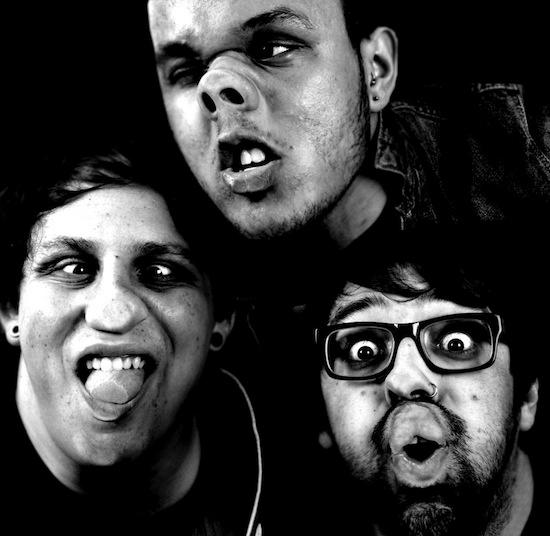Formed in the city of Leeds – now a hub of musical excitement thanks to relentless champions of frenetic and oft-disconcerting noise Brew Records – Castrovalva are a truly puzzling act to grasp upon first listen. Neither a fully-fledged noise rock band nor committed purveyors of the grime they so frequently pay homage to, digesting their extremely rich concoction of influences can often prove daunting for many a new listener.
At their most incensed, the band’s deliberately abrasive stream of eccentric bombast can feel as if members of Lightning Bolt and Hadouken! are clubbing together to grind your ears into a fine paste by hurling cans of Red Bull at them. However, this is no bad thing. Much like that heinously addictive substance itself, their music provides such a fervent rush of adrenaline that it’s hard to stay away for too long. Once the listener opens the messy floodgates of terror, confusion and ironic "rudebwoy" gestures, it’s hard to escape the destructive whirlpool of gleeful sonic mess that is Castrovalva.
With their truly demented new record You’re Not In Hell My Friend, You’re In Purgatory out now through Brew (listen via the embed below), the Quietus caught up with vocalist Leemun Smith and drummer Dan Brader to discuss their diverse influences, creative approaches and rabid sound.
Could you tell us a bit about the writing process for the new album?
LS: We went back to Ross Halden [producer of Rolo Tomassi, Forward Russia and Blacklisters] who recorded our debut album. He’s almost like the fourth member of Castrovalva – he adds an extra dimension to our sound and pushes us very hard. It’s all 6pm to 6am recording shifts with him. He’s very professional and really keeps us in check – if he doesn’t like a section in a song, he’ll delete it and tell us to go back into the practice room to write something better. We’ll then have around 15 to 30 minutes to come up with something fresh and, of course, we’ll usually come out with a far better result. Without Ross, we would never have found our weird edge.
I had to move back to Birmingham a while ago, so we wrote most of this album via an iPhone app. If I had an idea, I would play it on my guitar, record it through the app, and then just send it over to Dan and Ant [Wright, bass]. When it came to recording, those two would just put their mark on it to flesh the track out.
DB: I remember the first few days of recording being very tough for me. On the first evening, I played drums for roughly 8 hours solid after only a few hours of setting up. Like Leemun said, a lot of this album was written long distance – ideas would always come in the form of emails or texts, which would slowly morph in style each time an extra little section was written. Every month or so, we would meet up and Leemun would crash at my house (which is also our rehearsal space) and flesh the songs out into a basic structure. After this, we would put the finishing touches to the songs in the studio, letting Ant loose with all of his pedals and overdubs.
How did the creative process surrounding the record compare with that of your debut?
LS: A lot of pedals were harmed in the making of this album
DB: To be fair, it was very similar. We’ve always improvised a lot in the studio. The only difference this time is that we had a little more time pre-recording to bounce ideas off of each other which really helped. I think the fact we’ve all been best friends for so long helps with the creative direction of the band too. No matter how stupid an idea is, we try it out in the practice or recording space at least once, out of respect for each other more than anything else. I’ve previously been in bands where ideas were rejected the moment they were conceived, so it’s really a healthy relationship that we have with one another.
You re-recorded a handful of older songs for the release of the album. What prompted this decision?
LS: After the debut, we knew we were onto something strong, and a few weeks after we began the songwriting process, new ideas starting spewing from us like vomit. We had all of these great songs like ‘Donut’, ‘In Our Prime’ and ‘Señorita’ written, but because not many people had necessarily heard them, or cared enough to seek out our split releases, we thought we’d polish them up. I felt that this album needed those songs, and they fit in beautifully. ‘Donut’ needed an additional club vibe, and ‘Señorita’ needed a new synth sound as the previous one felt a little outdated to me.
DB: We’d already been playing new versions of these songs at our live shows for months. I wasn’t really happy with a few drum parts or the ending of ‘Donut’, so Ant and I had a little play with them. I think the new versions are far better, and they definitely give this album a stronger sense of flow.
Your music is an utterly chaotic melting pot of different musical styles, yet they all piece together perfectly. How did you initially formulate your bizarre sound?
LS: We wanted to try things that we didn’t think would ever work, yet somehow… would! We’re not everyone’s cup of tea, but I’m okay with that. At least they won’t forget us. We’ve had our fair share of bad feedback too. If somebody asks a friend "have you heard Castrovalva?" and their friend responds with "yeah, they’re crap", at least they know of our band and our material. We’ve always wanted to make a mark on people through our individual sound.
DB: Ant has a mild addiction to buying things that make noises. Sound-wise, I think he’s the reason that we have so many doors open to whichever musical avenues we choose to explore. In regards to our style, I think the fact that we all have such varied musical tastes helps more than anything. I never understand it whenever I see people trying to start bands with adverts that read "Metallica fan looking for like-minded musicians to start metal band". Fuck that – why not get a dude who’s really into Prince or some shit to play rhythm? I think a problem that many bands fall into is that they become formulaic before they’ve even written a single note. One thing I love about this band is that we’ve never had a structured, prearranged approach to our song writing.
Is it a struggle for you to cram so many contrasting ideas into your songs or is it now something that comes naturally to you?
DB: As strange as it sounds, I think it would be harder for us to write a song that sticks to a single style. When we write, we always write in what we call "sections". Usually we don’t write entire songs in one sitting. We’ll start with an interesting little "section", then a week later I’ll have an idea and we’ll come up with another piece of music to merge the two "sections" together. If it sticks, we keep it, and if not, it’s either scrapped or used in another song. I think if we actually tried to write a "pop" song for example, we’d really, really find it tough to avoid cramming 5 different styles of music into the song. It’s never something we actually set out to do though. It just happens.
LS: It just comes out. I listen to so many genres and hear so many different riffs and melodies that it just comes naturally to me to stick something heavy next to something a little jazzy.
Taking into account the sheer diversity of your music, who are the artists that inspire Castrovalva?
LS: Mahavishnu Orchestra for structure. People often say The Mars Volta, and I can hear that, but I don’t think the Volta would ever go down the same noisy road as us.
DB: For me it’s always been Glassjaw for some of the melodies and The Blood Brothers for song structuring. And maybe Daughters for Ant’s inability to use fewer than 10 effects pedals per song.
There’s an undeniably strong element of noise rock within your music that would easily appease the fans of a few acts you’ve supported (such as HEALTH), yet your past has also seen you support the likes of Hadouken!. How have such differing music fans responded to your live show?
DB: Everything seems to have been positive regardless of who we’ve been supporting. I think we have enough of the noise elements to please fans of HEALTH or An Albatross, but also enough of the melody to appeal to fans of Hadouken! who we supported at Live at Leeds a few years ago.
Finally, what are your plans for the rest of the year?
DB: We have a tour supporting our labelmates Nine Black Alps and then our own tour in December with some good friends of ours, which we’ll reveal soon.
Castrovalva’s tour dates with Nine Black Alps run as follows:
OCTOBER
10th – King Tuts, Glasgow
11th – Duchess, York
13th – Bodega Social Club, Nottingham
14th – Joiners, Southampton
15th – Borderline, London
16th – Green Door Store, Brighton
17th – Clwb Ifor Bach, Cardiff
18th – Exchange, Bristol



